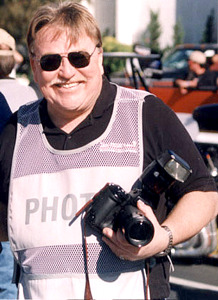

LEADERSHIP LACKING
Some of you may have noticed that the columnists here at DRO such as myself, Dave Densmore and Jeff Leonard have been laying off criticizing the powers that be in drag racing and specifically the NHRA. Our justification for this retreat from our established pattern of investigating and criticizing their actions or lack thereof was that maybe doing so was counterproductive.
As one prominent racer whose name I can't repeat for obvious reasons said; "The (fill in the four letters of your choice sanctioning body here) are a terrible organization, but where would we be without them?" Well, he is right.
We all came to the conclusion that the drag racing management teams needed a little relief from the kind of scrutiny that DRO subjects them to so, perhaps, they could get some things accomplished for the good of the sport and the racers.
So we bit our lips. Well, I tried and I can't see where it has done any good. I've decided that if the Senate of the United States can work in a building that might be contaminated with Anthrax then the people who are running drag racing can take the heat of a few questions and observations from the old Burkster.
The NHRA continues to say unofficially that they are very, very close to signing a title rights sponsor to replace the departing RJR for the 2002 season and beyond. A member of the management team told me that everyone on NHRA prez Tom Compton's management team desperately wants to announce something about the new sponsor but that it is just not going to happen until the deal is signed. Unfortunately, in the meantime race teams from Top Fuel to Super Pro with sponsorship or potential sponsorship in the balance are twisting in the wind because many sponsors real or potential are waiting to see if NHRA gets a series sponsor before they commit.
Those internet chat rooms propagating unproven rumors that NHRA is in financial trouble aren't helping the situation. It's past time for Tom Compton to step up and in some official manner, either through a press release or in National Dragster, state in the strongest possible terms that NHRA is in no trouble and will be doing business as usual regardless of when or if NHRA signs a new title rights sponsors.
Regardless of how the various factions in this sport posture for position and leadership, the fact is that NHRA represents drag racing to a majority of the fans and Corporate America. If those folks have the impression that NHRA is in trouble then drag racing as a whole will suffer. In this sport, or any sport for that matter, how you are perceived by the public is much more important than how you really are. Right now the general perception is that NHRA is in trouble. I think it is time for Tom Compton to step up and put everybody's mind at ease, if possible, before it becomes too late to do so. And if one week later NHRA announces the big title rights sponsor, what would be the problem with that? Good news followed by more good news is a good thing, right?
GIVE THE SPORTSMAN/LOW BUDGET RACERS A BREAK
While I'm on the subject of the racers, isn't it about time that the lower tier of professional racers and sportsman racers in general got a little more support and consideration from all sanctioning bodies?
Now before someone out there writes me a letter about how much contingency money for sportsman they've developed, forget it. Only two cars in each class at a race have a chance to collect contingency; the rest of the competitors get nada. Big contingency dollars look good in sanctioning body propaganda but the reality is that only a lucky few ever really benefit from contingency.
It is my observation that there are three groups that have any realistic chance of making money in drag racing: Sanctioning associations, track owners and operators, and Pro teams with seven-figure sponsorship packages.
Generally speaking, the best sportsman and low budget pro racers can hope for is to break even or not lose too much money. Consider the fact that approximately 60-65 percent of the cash purse in NHRA is paid to just the Top Fuel and Funny Car teams. The payout for those two classes alone adds up to over $400,000. Add in what is paid out to the Pro Stock, Pro Stock Truck and Pro Stock Motorcycle classes and it figures out that at any given race around 100 of the 600-700 racers that attend an NHRA National Event will get a majority of the money.
I'm not saying that the pros don't deserve the money and obviously they are łthe straw that stirs the drink," to quote Reggie Jackson, but make no mistake, the sportsman racers and their entry fees are very important to the bottom line for both NHRA and the track owners. As a car owner and sportsman racer over the last couple of decades, I've often felt that the officials of both NHRA and IHRA don't understand or relate to the sacrifices that the budget racers in both the sportsman and professional ranks have to make to support NHRA and IHRA.
Here are a couple of examples of what I am talking about. Depending on the event, NHRA sportsman racers have to arrive at a race anywhere from Tuesday to Thursday assuming they want to make more than one time run. They could come later but chances are they won't get through tech and registration in time for a time run. The point here is that a regular racer who wants to attend a race has to take a week off of work most of the time and pay a $240-$290 entry fee. If he is lucky enough to get to the semi-finals and lose he will get a payday of around $600 at a National Event and $200 at a divisional if he races Super Comp.
Perhaps it's not a problem to the guys who are paid by NHRA to be at a track by Tuesday before a race because that is their job and they get paid for doing it, but how hard is this on a guy who not only has to take (probably unpaid) time off from his job but then has to pay to get in and race.
IHRA isn't much better. Pro Modified racers (of which there are less than a half dozen with real sponsorship) have to pay $150 for car, driver and crew to enter the track, but they are racing for the same $1,000 to win that the class paid when it was formed over 10 years ago. Those racers start losing money the instant they turn the key in the tow vehicle.
The sanctioning bodies have to start looking at ways to make it easier and less expensive for racers to come to the event and I'm not talking about what it cost to build and maintain a race car. I'm talking about what it costs the low budget racer in salary, vacation time, travel money, and entry fees just to get the opportunity to race. The sanctioning bodies and the smart guys that run them have to find ways to cut the cost of getting to an event. If it means fewer days at the event or more round money, so be it.
Right now both NHRA and IHRA are living off of the momentum of the go-go nineties when there was plenty of money and jobs. They still get 700-900 cars at their marquee events. If you do the math that means that at an average NHRA event the racers can account for about $200,000 in the coffers and at an IHRA event somewhere in the area of a $100,000.
NHRA has so many entries for the upcoming race at Las Vegas, where they
only have space to park around 650 rigs, that they have told over 100
racers they won't be allowed to race because there is no room. But like
it or not, believe it or not, this country is in a recession and I believe
that, unless both sanctioning bodies start addressing the financial problems
of the little guy, they may find in this decade that having enough pit
space for all of the guys who want to race will be the least of their
problems.
 |
photo by James Drew
|
|||||||||||||||||||||||||||||||||||||||||||||||||||||||
Copyright 1999-2001, Drag Racing Online and Racing Net Source




